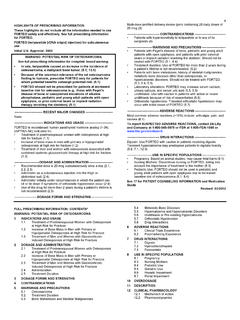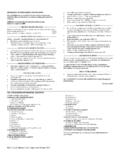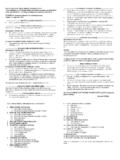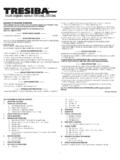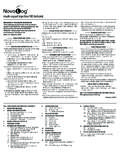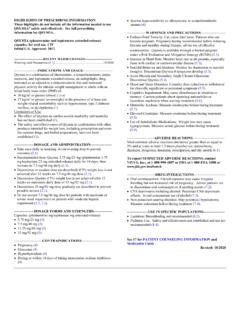Transcription of HIGHLIGHTS OF PRESCRIBING INFORMATION - LENVIMA
1 HIGHLIGHTS OF PRESCRIBING INFORMATION These HIGHLIGHTS do not include all the INFORMATION needed to use LENVIMA safely and effectively. See full PRESCRIBING INFORMATION for LENVIMA . LENVIMA (lenvatinib) capsules, for oral use Initial Approval: 2015 ----------------------------RECENT MAJOR CHANGES-------------------------- Indications and Usage, Endometrial Carcinoma ( ) 9/2019 Dosage and Administration, Recommended Dosage for Endometrial Carcinoma ( , , , ) 9/2019 warnings and Precautions ( ) 2/2020 ----------------------------INDICATIONS AND USAGE--------------------------- LENVIMA is a kinase inhibitor that is indicated: For the treatment of patients with locally recurrent or metastatic, progressive, radioactive iodine-refractory differentiated thyroid cancer (DTC).
2 ( ) In combination with everolimus, for the treatment of patients with advanced renal cell carcinoma (RCC) following one prior anti-angiogenic therapy. ( ) For the first-line treatment of patients with unresectable hepatocellular carcinoma (HCC). ( ) In combination with pembrolizumab, for the treatment of patients with advanced endometrial carcinoma that is not microsatellite instability-high (MSI-H) or mismatch repair deficient (dMMR), who have disease progression following prior systemic therapy and are not candidates for curative surgery or radiation. This indication is approved under accelerated approval based on tumor response rate and durability of response. Continued approval for this indication may be contingent upon verification and description of clinical benefit in the confirmatory trial.
3 ( ) ----------------------DOSAGE AND ADMINISTRATION------------------------- DTC: The recommended dosage is 24 mg orally once daily. ( ) RCC: The recommended dosage is 18 mg orally once daily with everolimus 5 mg orally once daily. ( ) HCC: The recommended dosage is based on actual body weight: o 12 mg orally once daily for patients greater than or equal to 60 kg o 8 mg orally once daily for patients less than 60 kg. ( ) Endometrial Carcinoma: The recommended dosage is 20 mg orally once daily with pembrolizumab 200 mg administered as an intravenous infusion over 30 minutes every 3 weeks. ( ) Modify the recommended daily dose for certain patients with renal or hepatic impairment. ( , ) ---------------------DOSAGE FORMS AND STRENGTHS---------------------- Capsules: 4 mg and 10 mg.
4 (3) -------------------------------CONTRAIND ICATIONS------------------------------ None. (4) ----------------------- warnings AND PRECAUTIONS------------------------ Hypertension: Control blood pressure prior to treatment and monitor during treatment. Withhold for Grade 3 hypertension despite optimal antihypertensive therapy. Discontinue for Grade 4 hypertension. ( , ) Cardiac Dysfunction: Monitor for clinical symptoms or signs of cardiac dysfunction. Withhold or discontinue for Grade 3 cardiac dysfunction. Discontinue for Grade 4 cardiac dysfunction. ( , ) Arterial Thromboembolic Events: Discontinue following an arterial thromboembolic event. ( , ) Hepatotoxicity: Monitor liver function prior to treatment and periodically during treatment.
5 Withhold or discontinue for Grade 3 or 4 hepatotoxicity. Discontinue for hepatic failure. ( , ) Renal Failure or Impairment: Withhold or discontinue for Grade 3 or 4 renal failure or impairment. ( , ) Proteinuria: Monitor for proteinuria prior to treatment and periodically during treatment. Withhold for 2 or more grams of proteinuria per 24 hours. Discontinue for nephrotic syndrome. ( , ) Diarrhea: May be severe and recurrent. Promptly initiate management for severe diarrhea. Withhold or discontinue based on severity. ( , ) Fistula Formation and Gastrointestinal Perforation: Discontinue in patients who develop Grade 3 or 4 fistula or any Grade gastrointestinal perforation. ( , ) QT Interval Prolongation: Monitor and correct electrolyte abnormalities.
6 Withhold for QT interval greater than 500 ms or for 60 ms or greater increase in baseline QT interval. ( , ) Hypocalcemia: Monitor blood calcium levels at least monthly and replace calcium as necessary. Withhold or discontinue based on severity. ( , ) Reversible Posterior Leukoencephalopathy Syndrome (RPLS): Withhold for RPLS until fully resolved or discontinue. ( , ) Hemorrhagic Events: Withhold or discontinue based on severity. ( , ) Impairment of Thyroid Stimulating Hormone Suppression/Thyroid Dysfunction: Monitor thyroid function prior to treatment and monthly during treatment. ( ) Impaired Wound Healing: Withhold LENVIMA for at least 1 week before elective surgery. Do not administer for at least 2 weeks following major surgery and until adequate wound healing.
7 The safety of resumption of LENVIMA after resolution of wound healing complications has not been established. ( ) Embryo-Fetal Toxicity: Can cause fetal harm. Advise of potential risk to a fetus and use of effective contraception. ( , , ) ------------------------------ADVERSE REACTIONS------------------------------- In DTC, the most common adverse reactions (incidence 30%) for LENVIMA are hypertension, fatigue, diarrhea, arthralgia/myalgia, decreased appetite, decreased weight, nausea, stomatitis, headache, vomiting, proteinuria, palmar-plantar erythrodysesthesia syndrome, abdominal pain, and dysphonia. ( ) In RCC, the most common adverse reactions (incidence 30%) for LENVIMA and everolimus are diarrhea, fatigue, arthralgia/myalgia, decreased appetite, vomiting, nausea, stomatitis/oral inflammation, hypertension, peripheral edema, cough, abdominal pain, dyspnea, rash, decreased weight, hemorrhagic events, and proteinuria.
8 ( ) In HCC, the most common adverse reactions (incidence 20%) for LENVIMA are hypertension, fatigue, diarrhea, decreased appetite, arthralgia/myalgia, decreased weight, abdominal pain, palmar-plantar erythrodysesthesia syndrome, proteinuria, dysphonia, hemorrhagic events, hypothyroidism, and nausea. ( ) In Endometrial Carcinoma, the most common adverse reactions (incidence 20%) for LENVIMA and pembrolizumab are fatigue, hypertension, musculoskeletal pain, diarrhea, decreased appetite, hypothyroidism, nausea, stomatitis, vomiting, decreased weight, abdominal pain, headache, constipation, urinary tract infection, dysphonia, hemorrhagic events, hypomagnesemia, palmar-plantar erythrodysesthesia, dyspnea, cough, and rash. ( ) To report SUSPECTED ADVERSE REACTIONS, contact Eisai Inc.
9 At 1-877-873-4724 or FDA at 1-800-FDA-1088 or -------------------------USE IN SPECIFIC POPULATIONS---------------------- Lactation: Advise not to breastfeed. ( ) See 17 for PATIENT COUNSELING INFORMATION and FDA-approved patient labeling. Revised: 02/2020 FULL PRESCRIBING INFORMATION : CONTENTS* 1 INDICATIONS AND USAGE Differentiated Thyroid Cancer Renal Cell Carcinoma Hepatocellular Carcinoma Endometrial Carcinoma 2 DOSAGE AND ADMINISTRATION Important Dosage INFORMATION Recommended Dosage for Differentiated Thyroid Cancer (DTC) Recommended Dosage for Renal Cell Carcinoma (RCC) Recommended Dosage for Hepatocellular Carcinoma (HCC) Recommended Dosage for Endometrial Carcinoma Dosage Modifications for Adverse Reactions Dosage Modifications for Severe Renal Impairment Dosage Modifications for Severe Hepatic Impairment Preparation and Administration 3 DOSAGE FORMS AND STRENGTHS 4 CONTRAINDICATIONS 5 warnings AND PRECAUTIONS Hypertension Cardiac Dysfunction Arterial Thromboembolic Events Hepatotoxicity Renal Failure or Impairment Proteinuria Diarrhea Fistula Formation and Gastrointestinal Perforation QT Interval Prolongation Hypocalcemia Reversible Posterior Leukoencephalopathy Syndrome Hemorrhagic Events Impairment of Thyroid Stimulating Hormone Suppression/Thyroid Dysfunction Impaired Wound
10 Healing Embryo-Fetal Toxicity 6 ADVERSE REACTIONS Clinical Trials Experience Postmarketing Experience 7 DRUG INTERACTIONS Drugs That Prolong the QT Interval 8 USE IN SPECIFIC POPULATIONS Pregnancy Lactation Females and Males of Reproductive Potential Pediatric Use Geriatric Use Renal Impairment Hepatic Impairment 10 OVERDOSAGE 11 DESCRIPTION 12 CLINICAL PHARMACOLOGY Mechanism of Action Pharmacokinetics 13 NONCLINICAL TOXICOLOGY Carcinogenesis, Mutagenesis, Impairment of Fertility 14 CLINICAL STUDIES Differentiated Thyroid Cancer Renal Cell Carcinoma Hepatocellular Carcinoma Endometrial Carcinoma (EC) 16 HOW SUPPLIED/STORAGE AND HANDLING 17 PATIENT COUNSELING INFORMATION *Sections or subsections omitted from the full PRESCRIBING INFORMATION are not listed.



